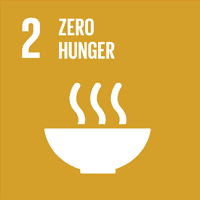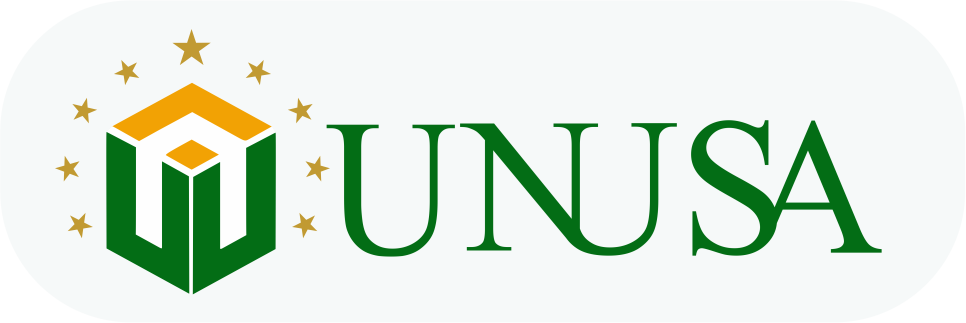2
TANPA
KELAPARAN
Menghilangkan Kelaparan, Mencapai Ketahanan Pangan dan Gizi yang Baik, serta Meningkatkan Pertanian Berkelanjutan
Zero Hunger

Universitas Nahdlatul Ulama Surabaya (Unusa) is committed to addressing food insecurity and promoting sustainable, healthy food options for its students, staff, and surrounding communities. Recognizing the critical role of nutrition in well-being and academic performance, Unusa has developed various programs to support access to nutritious food, especially during challenging times like the Covid-19 pandemic. These initiatives are designed to alleviate immediate food shortages, ensuring that students and staff have access to reliable food sources, while also promoting long-term sustainability in food supply.
To support food security, Unusa has implemented strategies that focus on sustainable agricultural practices, benefiting not only the university community but also local farmers and food producers. By encouraging sustainable methods of food production, Unusa helps build a resilient food system that can withstand economic and environmental challenges. These efforts include partnerships with agricultural experts and local farmers to promote eco-friendly farming practices, ensuring that food production aligns with environmental conservation goals.
Unusa approach to sustainable agriculture extends beyond education, as the university offers hands-on training programs aimed at empowering local farmers and food producers. Through these programs, participants gain practical skills in sustainable farming, enhancing productivity while protecting the environment. Unusa also helps connect these farmers with new markets, creating opportunities for economic growth and increased food security in the region. By providing farmers with both knowledge and market access, Unusa fosters a self-sustaining community that can thrive independently and contribute to broader food security goals.
Ultimately, Unusa commitment to food security and sustainable agriculture reflects a holistic approach to community empowerment and health. By addressing the entire food chain—from sustainable production practices to access for students and staff—Unusa not only mitigates food insecurity but also strengthens local economies and promotes a culture of sustainable development. These efforts underscore Unusa mission to support the community, ensuring that nutritional and economic needs are met while fostering a healthier, more resilient food system for all.
Student Hunger Alleviation and Food Security Initiatives at Universitas Nahdlatul Ulama Surabaya (Unusa)
- Student Food Insecurity Program
- Interventions for Hunger Relief Among Students and Staff
- Access to Affordable and Diverse Culinary Options
- Healthy, Nutritions, and Sustainable Food Choices
Unusa recognizes the importance of addressing food insecurity, especially highlighted during the Covid-19 pandemic when many students faced limited access to food due to lockdowns and reduced availability of open food vendors. In response, Unusa implemented targeted interventions to support students who remained in boarding houses and rented accommodations, providing food packages to ensure their nutritional needs were met despite the scarcity of local food options. This initiative demonstrated Unusa commitment to student well-being by directly addressing food insecurity in times of crisis.
In addition to supporting students, Unusa extended assistance to staff impacted by the pandemic. The Faculty of Mathematics and Natural Sciences organized food package distributions for lecturers and educational staff who faced challenges due to Covid-19 disruptions. This outreach provided crucial support to Unusa academic community, alleviating food insecurity among staff and ensuring that the university’s community members had access to essential resources during the pandemic.
Located in Surabaya, Unusa benefits from a vibrant culinary scene where students and staff can find a wide array of affordable food options, from street food and traditional markets to cafes and restaurants offering both Indonesian and international cuisine. This variety enhances food security by making diverse and affordable food choices available off-campus, meeting the dietary preferences and financial needs of students and staff alike.
Unusa is committed to promoting healthy and sustainable food options on campus. Through the Halalan Thayyiban Research and Education (Htrend) center, Unusa conducts educational sessions for campus canteen managers, emphasizing the importance of offering healthy and nutritious food choices. By encouraging sustainable practices and the sale of health-conscious foods, Unusa supports the academic community’s well-being while also promoting a campus culture centered on balanced and sustainable food choices.
Promoting National Food Security and Sustainable Agriculture at Universitas Nahdlatul Ulama Surabaya (Unusa)
- Support for Local Food Produces
- Educational Initiatives and Practical Training in Agro Industry
- Knowledge and Technology Transfer for Sustainable Farming
- Prioritizing Local and Sustainable Sources
Unusa provides community support by assisting in the marketing of criping, a nutritious cassava-based snack produced by local food artisans. This initiative is offered free of charge, helping local producers reach broader markets and improve their income. Additionally, Unusa works to boost community productivity by training local youth in permaculture, equipping them with sustainable agricultural skills to ensure long-term food production and environmental stewardship.
Unusa Faculty of Medicine organizes community service projects that involve educating the public on safe and effective methods of animal slaughter, meat management, and the preparation of nutritious meals. Furthermore, Unusa actively supports the development of the local agro-industry. In Soropaten Village, Karanganom, Klaten, UII assists farmers in creating diverse corn-based products, including corn chips, flavored marning, corn lunkhead, and various types of corn-based frozen treats. Through counseling, hands-on practice, and ongoing assistance, farmers learn how to process, package, and market their products, thereby increasing the economic value of their produce and improving local food security and nutrition.
By offering access to university resources, Unusa facilitates knowledge and technology transfer that enhances sustainable farming practices among local farmers and producers. Through community service and training programs, UII provides guidance on developing high-quality agro-products, building technical skills, and implementing sustainable practices. This support not only aids in creating quality products but also bolsters the local economy by helping small farmers add value to their harvests, ensuring a steady income while promoting sustainable agriculture.
Unusa is committed to sourcing products from local, sustainable suppliers whenever possible. This priority helps strengthen the local economy, reduces the carbon footprint associated with food transportation, and supports environmentally responsible practices within the university’s supply chain.
